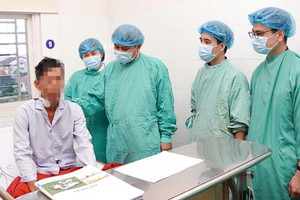
This morning, the Ho Chi Minh City Department of Health announced that it had requested seven central hospitals to enter into partnership agreements to support the specialized development of Thu Duc General Hospital during the 2025–2030 period. This aims to guide the hospital's transformation into a fully accredited Grade I general hospital, with key specializations in trauma emergency care and endovascular intervention. The long-term goal is for Thu Duc General Hospital to become a cornerstone facility within the specialized medical cluster in Thu Duc City.
Accordingly, seven general and specialized hospitals including Gia Dinh People's Hospital, Binh Dan Hospital, Ho Chi Minh City Heart Institute, Eye Hospital, Children's Hospital 2, Oncology Hospital, and the Central Hospital of Odonto-Stomatology have officially signed cooperation agreements to support the transfer of specialized medical techniques to the new hospital in Thu Duc City.
The Ho Chi Minh City health sector plans to continue investing in and developing the Thu Duc specialized medical cluster. This cluster will include Thu Duc Regional General Hospital, Oncology Hospital 2, Thu Duc City Hospital, Le Van Thinh Hospital, Le Van Viet Hospital, Eastern Military Hospital, Hoan My Thu Duc General Hospital, and American International Hospital, as well as several new general and specialized hospitals.
Director of the Ho Chi Minh City Department of Health Associate Professor Tang Chi Thuong advocates for a strategic focus on developing key specialties such as emergency medicine, critical care, internal medicine, pediatrics, diagnostic imaging, laboratory medicine, and pathology—to consolidate resources and achieve comprehensive specialization in general hospitals.
Additionally, he emphasizes the critical need for robust development in emergency trauma like neurology, thoracic, abdominal, maxillofacial and general surgery including oncological surgery, chemotherapy, and palliative care, alongside thoracic, vascular, neurosurgical, orthopedic trauma, and obstetrics and gynecology surgery.
Concurrently, the systematic development of remaining specialties is essential to comprehensively address the diverse medical examination, treatment, and emergency care requirements of a general hospital. Notably, prioritized attention should be directed towards the advancement of discrete specialties like ophthalmology, maxillofacial surgery, otolaryngology and rehabilitation services.
























